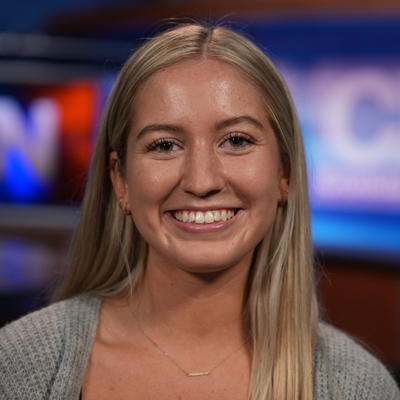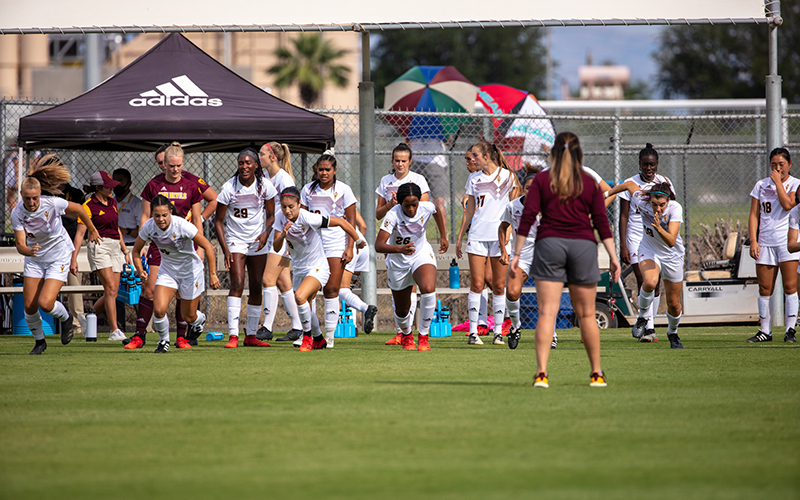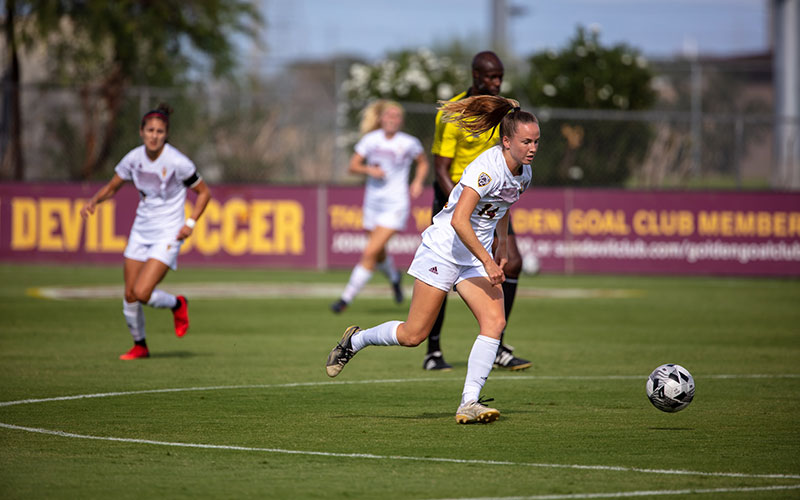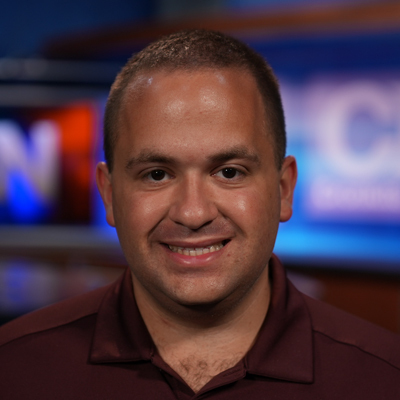TEMPE – Iceland’s Birta Gudlaugs, a freshman on Arizona State’s women’s soccer team, committed to the Sun Devils without ever stepping foot in the United States, much less on campus.
But after only a couple of hours on the telephone with ASU coach Graham Winkworth, Gudlaugs was sold on the family atmosphere Winkworth had built and decided to leave the Arctic tundra for the Sonoran Desert without even making an official visit.
Gudlaugs, who had been focusing only on East Coast programs, was riveted by the close-knit feel and the potential to play an elite level of soccer in the Pac-12 Conference.
“I remember coach Graham telling me that this was family,” Gudlaugs said. “That the group was really close.”
It’s not just a family, it’s a diverse, global group that Winkworth has assembled.
Winkworth has established an international recruiting effort unique from ASU’s Pac-12 competitors. The Sun Devil roster includes 13 international players from 10 countries – including the U.S. – and five different continents.
Winkworth’s roster of 31 includes players from Iceland, New Zealand, England, the Netherlands, Brazil, Germany, Mexico, Canada, Japan and the United States.
“We look for the best players in the world,” Winkworth said. “We’re looking for the top American players, but we’re also looking for the top international players.”
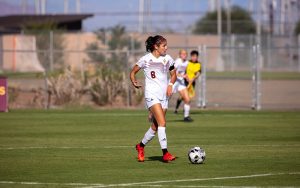
Senior Alexia Delgado from Nayarit, Mexico notched a team-high seven assists last season. She is one of 13 international players on the ASU women’s soccer roster. (Photo by James Franks/Cronkite News)
As lead international recruiter, Winkworth travels the world attending games, often focusing on scouting national teams across the globe to identify their best prospects.
“I’ve been to all sorts of countries,” Winkworth said. “Bosnia, Lithuania, England, Germany, Holland, Spain, Bulgaria, Sweden, Brazil, Trinidad, Mexico. You name it, I’m all over the world.”
The entire recruiting process revolves around the combined efforts of Winkworth, assistant coach Shigeyoshi ‘Sugar’ Shinohara and assistant coach Jo Chubb.
Hundreds of emails flood Shinohara’s inbox every week as potential prospects ask the ASU staff to view their highlight reel or visit an upcoming game. As the “front line” recruiter, Shinohara filters through all the incoming requests and categorizes each player into three basic groups: “No. Pretty Decent. Really Good,” he said.
The “no” category is for those players not considered as potential candidates for the team. Players in the “pretty decent” category are typically asked to send over additional video and information on upcoming games or showcases they’ll be playing in that Shinohara can attend.
The “really good” category is reserved for players Shinohara sends Winkworth’s way and who are usually invited to attend one of the Sun Devil Soccer Camps, which are open for any player to attend.
Camps in soccer and other sports give athletes a chance to get an intimate look at what it will take to play at the college level, expose them to the coaches and give them a glimpse at the facilities.
It is just as beneficial to the coaches, too.
“Soccer is important, of course; we need good soccer players,” Shinohara said. “But once we know that player is good, we want to get to know the person. So when we do the recruiting process, we talk about soccer and academics, but more importantly what she is like and what we are like.”
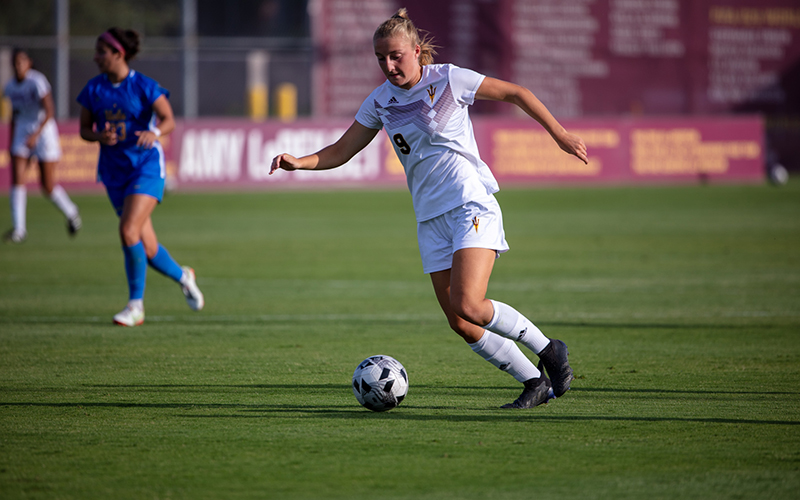
Senior Nicole Douglas from London, England scored her 45th goal against Utah in October. ASU women’s soccer coach Graham Winkworth has established a global recruiting program to attract players like Douglas. (Photo by James Franks/Cronkite News)
Arizona’s warm winter weather and ASU’s campus in Tempe make it an ideal destination for international recruits, which can make the job a little easier for Winkworth and Chubb. Both are responsible for the international recruiting initiative.
Once Winkworth has scouted an international prospect, he will reach out to her national team coach or have Chubb connect with the player via social media. Winkworth has developed friendly relationships with many national team coaching staffs.
Some are reluctant to send their players overseas to America while others who are “all for it,” according to Winkworth, and see it as a great opportunity to receive an education and play a high level of soccer while experiencing a different part of the world.
ASU’s Pac-12 competitors aren’t close to the 13 international players the Sun Devils have on the team. Colorado and Oregon are next on the list with players from five countries on their rosters. Arizona is last on the list with no international players.
The allure of playing in the Pac-12, the most competitive collegiate conference in women’s soccer, is enough for some international recruits to move to the U.S.
But Winkworth and his staff try to take it a step further by fostering the family atmosphere.
“This is their home,” Shinohara said. “This is their family. We care about the person and more importantly we create a family environment.”
Gudlaugs said she is amazed at the “countless” emails she receives from various ASU staff, who are checking in on her and ensuring her experience as an international student is up to par with what she was promised.
She said just flying into the U.S. from Iceland was “a little scary” as Transportation Security Administration agents pulled her aside at security to check her Visa and other records.
And she said her transition from Iceland to life in the U.S. would have been much more difficult had it not been for her teammates.
“The moment you step foot in that locker room, and meet the whole team, you just know that you’re a part of their family,” Gudlaugs said. “It’s very nice to know no matter who you turn to, that they’re going to be there for you. That’s not something that’s guaranteed in every sport.”
Most countries don’t offer the combination of high-level soccer and an education that allows a bachelor’s degree within four years that athletes get in the U.S. That aspect of ASU is what drew senior Eva Van Deursen from the Netherlands to Tempe.
Van Deursen recalls being impressed on her official visit when she saw the ASU soccer facilities, describing them as “basically professional facilities.” Those, along with the academic opportunities, made it an “easy decision,” Van Deursen said.
Soccer wasn’t a very popular sport for women in the Netherlands when Van Deursen was growing up, but when the Netherlands defeated Denmark in the UEFA Women’s Championship in 2017, women’s soccer “blew up,” Van Deursen said.
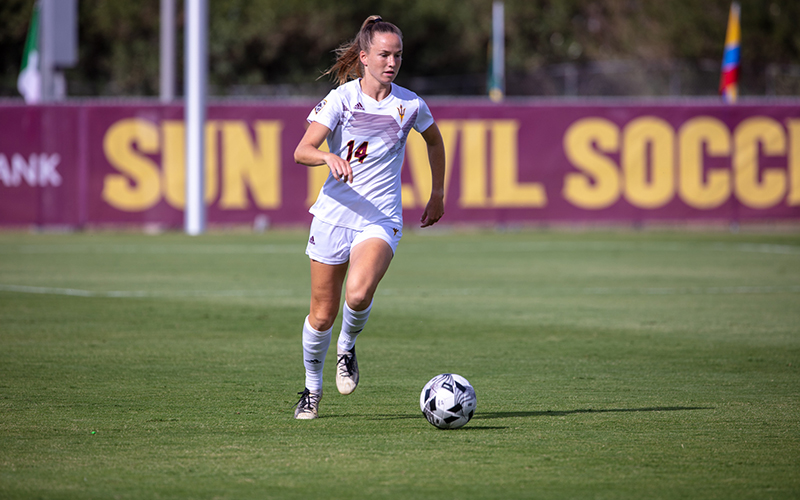
Senior Eva Van Deursen from Veldhoven, Netherlands sought the opportunity to compete at a high level of soccer while pursuing a degree and chose Arizona State.(Photo by James Franks/Cronkite News)
The Netherlands women’s team was ranked 4th in the world by FIFA as of August 2021.
Women’s soccer in Iceland has followed the same trend, with men’s soccer traditionally being more popular. But women’s soccer is “making a big jump” right now, Gudlaugs said. The Iceland women’s national team was ranked 16th in the world by FIFA as of August 2021.
Both Van Deursen and Gudlaugs agree that soccer in the U.S. is “more skillful, tactical and fast-paced” than in their home countries.
Gudlaugs and Van Duersen speak English, so a language barrier wasn’t a problem for them or the ASU staff during recruiting.
But that isn’t always the case, according to Winkworth. Recruiting so many international players can get tricky.
“Back in the day, when I had a recruit from Brazil, I decided to call her up,” Winkworth said. “I had got on Google (Translate) and I had typed up what I was going to say and it did the translation.
“So I’m there speaking Portuguese – what I think is fantastic Portuguese – to what I thought was this young lady, Tasia. And then it was Tasia’s sister, apparently. She responded back in Portuguese, and of course I didn’t have a clue what she was saying.”
Even translating Winkworth’s British version of English to the American brand can be a challenge occasionally.
Winkworth recalled a day at practice when he said, “Oh that was a bit dodgy” and senior Alexia Delagdo from Mexico asked, “Coach, what is dodgy?”
“We have a lot of fun,” Winkworth said, chuckling. “But we all speak the same soccer language.”
